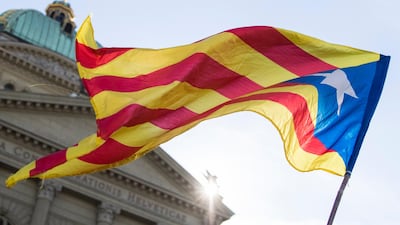What has happened?
Catalonia has declared independence from Spain, both in a vote by the Catalan parliament and in a referendum held on October 1. This unilateral declaration of independence (UDI) is illegal under the Spanish constitution of 1978 and is based on partial results from the referendum, in which 90 per cent of those who voted endorsed secession. However, the turnout was unregistered and comprised less than half of the overall electorate.
What will happen now?
By breaching their constitutional commitments, the Catalan government leaders are acting illegally and could be arrested. The prime minister of Spain, Mariano Rajoy, has stripped Catalonia of its autonomy (under Article 155 of the Spanish constitution), sacked the Catalan government and installed his own deputy prime minister as leader of the region. It remains possible that the president of Catalonia, Carles Puigdemont, and other Catalan government figures could go to jail. There are also fears that Spanish security forces will be sent into Catalonia and there will be a repeat of the clashes that marred the referendum which reportedly saw 900 people injured.
__________
Read more
Catalan votes for independence as Madrid approves direct rule
Catalan leader calls for peaceful resistance to Madrid rule
__________
What will the economic implications be?
Catalonia is one of Spain's richest regions, and it was that economic power which gave the impetus to many in the independence movement. However, since the vote many companies have either already moved their operations from the province, or indicated that they would do so in the event of a UDI, fearful of being stuck outside of the European Union if Catalonia was expelled from it. Savers have also been taking money out of Catalan banks and have been investing in Spanish financial institutions, fearful that independence will bankrupt the region.
What will be the implications for Europe?
EU officials and foreign ministers of many other European countries have been fierce in their denunciation of Catalan independence, giving support to Mr Rajoy and warning that an independent Catalonia would be immediately booted out of the EU and would only be readmitted if Spain supported their membership bid – which is highly unlikely. There are independence movements across the continent which would be emboldened by the Catalan decision – in northern Italy, Corsica, Scotland and Bavaria – and this is a headache that the EU doesn't need and will act to make it appear to be the worst possible option to deter others.
What has happened in other countries?
When Slovenia voted in 1990 to secede from Yugoslavia by a margin of 90 per cent to 10 per cent on a turnout of 93 per cent, the country's leadership declared independence then immediately suspended it while it entered into negotiations. An MEP from Mr Puigdemont's party has suggested that this would be good starting point for Catalonia. Other Balkan countries such as Kosovo and Montenegro experienced ultimately peaceful routes to independence, but they followed a series of terrible civil wars that tore former Yugoslavia apart during the 1990s. In Africa, the independence of Eritrea and South Sudan involved bloody civil wars which killed tens of thousands of people.

